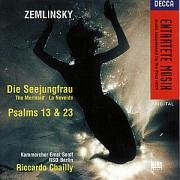| All Artists: Alexander Zemlinsky, Riccardo Chailly, Kammerchor Ernst Senff Title: Zemlinsky: Die Seejungfrau (The Mermaid) / Psalms 13 & 23 Members Wishing: 0 Total Copies: 0 Label: London / Decca Release Date: 11/11/1997 Genre: Classical Styles: Opera & Classical Vocal, Forms & Genres, Fantasies Number of Discs: 1 SwapaCD Credits: 1 UPC: 028944496925 |
Search - Alexander Zemlinsky, Riccardo Chailly, Kammerchor Ernst Senff :: Zemlinsky: Die Seejungfrau (The Mermaid) / Psalms 13 & 23
 | Alexander Zemlinsky, Riccardo Chailly, Kammerchor Ernst Senff Zemlinsky: Die Seejungfrau (The Mermaid) / Psalms 13 & 23 Genre: Classical
|
Larger Image |
CD Details |
CD ReviewsIt should be clear by now that Zemlinsky is one of the Giant Pater Ecstaticus | Norway | 10/17/2006 (5 out of 5 stars) "The recent gorgeous recording of his Lyrische Symphonie [1923] with Matthias Goerne, Christine Schaefer, conducted by Christoph Eschenbach (ZEMLINSKY: Lyric Symphony op. 18) is continuing proof of that fact, I believe.
But about ten years earlier, Riccardo Chailly (like James Conlon, Antony Beaumont and Gerd Albrecht, an avid advocate of Zemlinsky's art) set out on a series of recordings of Zemlinsky's masterworks, like his orchestral fantasy/symphonic poem Die Seejungfrau (of around 1900), which we are reviewing here. While not as freely polychromatic and dense as his later Lyrische Symphony, and while not as grand in scope (it is over half an hour long), this Die Seejungfrau is in itself an engaging piece of evocative music. Here it is given a dramatic reading by Riccardo Chailly conducting the Radio-Symphonie-Orchester (now Deutsche Symphonie-Orchester) Berlin, with an almost psychologic intensity, which also characterizes his cycle of Mahler symphonies he recorded with (mainly) the Royal Concertgebouw Orchestra. Although Die Seejungfrau was written after the story by Hans Christian Andersen, and although Alexander Zemlinsky himself had devised some kind of 'program', the music doesn't follow the narrative explicitly, as it was Zemlinsky's (and Schoenberg's) wish to write music which transcended the distinction between 'absolute' and 'programme' music. The music for Die Seejungfrau begins mysteriously, with low brass and slowly toiling low harp-strings, soon covered by rustlings of high harp and flute, evoking a sense of looking up, from the depths of the sea bed towards the light of the bright sun, reflected through the waves far away up above ... And then (at [2:05]) there comes the sweet but at the same time wonderfully noble theme of the mermaid, followed again [2:30] by the haunting 'deep sea music' from which grows a theme expressing a deep sense of longing: the dreams and hopes of the little mermaid (?), whose theme we hear again at [4:02]. And then, at about [4:20], the full passion is released wit one of the most beautifully caressing, warm melodies ever composed, from which a number of motives grow and develop onwards, shifting the moods the whole of the time, evoking the hopes and noble passions of the mermaid as she rescues the prince; as she falls in love with him; as she visits the Sea Witch to ask her to transform her tail into human legs; as she is in pain with every step she takes while in the human world; as she sees how the prince she passionately loves falls in love with the Foreign Princess; as she sees how the Prince marries the Princess; as she sacrifices herself by refusing to kill the bridal pair (the only way to regain her original state); and finally, as she is transformed into a spirit of the air ... This is wonderfully evocative music, played with utter and loving care for the polychromatic intricacies that are a hallmark of the music of Alexander Zemlinsky. Zemlinsky's music takes a unique position between, so to say, Wagner and Schoenberg. But where Schoenberg was to develop his polychromaticism into atonality and dodecaphony, Zemlinsky did not venture into that direction. Zemlinsky deserves to be heard just as much as his contemporaries Mahler and Schoenberg, I believe. Thank heavens there are such advocates like Riccardo Chailly to give us the best possible performances, in opulently recorded sound, of this beautiful music. Highly recommended. But if you feel this is beautiful music, then please do try Zemlinsky's highly sophisticated, colorful and intensely emotional Lyrische Symphonie, marvellously sung by Matthias Goerne and Christine Schaefer and excellently conducted by Christoph Eschenbach." |

 Track Listings (5) - Disc #1
Track Listings (5) - Disc #1